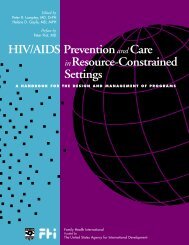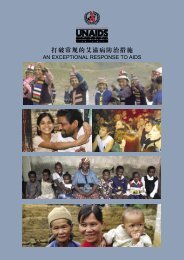The Training of Trainers Manual - UNFPA
The Training of Trainers Manual - UNFPA
The Training of Trainers Manual - UNFPA
Create successful ePaper yourself
Turn your PDF publications into a flip-book with our unique Google optimized e-Paper software.
Impact on youth<br />
Youth participation can:<br />
■ Help youth form higher aspirations, gain confidence, attain resources, improve skills and knowledge,<br />
change attitudes, and develop more meaningful relationships with adults<br />
■ Foster resilience by giving youth opportunities to contribute to family or community<br />
■ Enhance young people’s social competence, problem-solving skills, and autonomy, and give them a<br />
sense <strong>of</strong> purpose<br />
■ Help young people be more open to learning, engaging in critical dialogue, exercising creativity, and<br />
taking initiative<br />
Research has identified factors that seem to account for the difference between those young people<br />
who emerge from high-risk situations with positive results and those who do not. While many<br />
factors influence health behaviors, resilient youth, in particular, display some important<br />
characteristics, including:<br />
■ Social competence, including responsiveness, flexibility, empathy, caring, communication skills, a<br />
sense <strong>of</strong> humor, and other pro-social behaviors<br />
■ Problem-solving skills, including the ability to think abstractly, reflectively, and flexibly and the<br />
ability to arrive at alternative solutions to cognitive and social problems<br />
■ Autonomy, including a sense <strong>of</strong> identity and an ability to act independently and to exert control over<br />
the individual’s environment<br />
■ Sense <strong>of</strong> purpose and future, including having healthy expectations, goals, an orientation towards<br />
success, motivation to achieve, educational aspirations, hopefulness, hardiness, and a sense<br />
<strong>of</strong> coherence<br />
<strong>The</strong> findings above come primarily from literature on youth development, which is defined as the<br />
ongoing growth process in which youth attempt to meet their basic personal and social needs to be<br />
safe, feel cared for, be valued, be useful, be spiritually grounded, and build the skills and competencies<br />
that allow them to function and contribute in their daily lives. Thus, youth are more likely to develop in<br />
positive ways when they have opportunities to:<br />
■ Feel physically and emotionally safe<br />
■ Build relationships with caring, connected adults<br />
■ Acquire knowledge and information<br />
■ Engage in meaningful and purposeful activities in ways that <strong>of</strong>fer both continuity and variety<br />
Research also shows that contributing to one’s community has many positive outcomes. One study<br />
found that college students who provided community service for credit significantly increased their<br />
belief that people can make a difference and that people should be involved in community service and<br />
advocacy. <strong>The</strong>y became less likely to blame social services clients for their misfortunes and more likely<br />
to stress a need for equal opportunities.<br />
Behavior change theory and research on resiliency suggest that, while the types <strong>of</strong> activities <strong>of</strong>fered by<br />
successful youth development programmes vary, the emphasis lies in providing opportunities for active<br />
172 <strong>Training</strong> <strong>of</strong> <strong>Trainers</strong> <strong>Manual</strong>

















